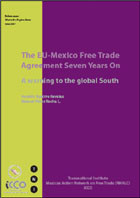The EU-Mexico Free Trade Agreement Seven Years On A warning to the global South
Topics
Regions
The Mexico-EU FTA after seven years in force shows how the objectives that were announced during negotiations and that it purportedly promoted were nothing more than rhetoric in light of the evidence of economic and social impacts it has caused.

Authors
When the EU-Mexico Free Trade Agreement (FTA) came into force in 2000, the then EU trade commissioner Pascal Lamy touted its significance for the future of Europe’s trade strategy. It has since served as a model for further Investment Promotion and Protection Agreements (IPPAs) between the EU and Latin American countries and regions.
Seven years on, though, the impact of the EU-Mexico FTA is clear. Instead of the promised economic and social benefits, the treaty has left the Mexican state unable to implement policies to promote local small and medium size companies. Mexico’s finance sector is now at the mercy of EU capital, while across various economic sectors the FTA has worked to the benefit of European transnational corporations and to the detriment of Mexican industries.
The Mexican example should serve as a warning to other countries in the global South, argue Rodolfo Aguirre Reveles and Manuel Perez Rocha. Where reciprocal trade and investment agreements are made between highly unequal economic actors, these damage national and local economic development and benefit only a handful of transnational corporations.
Pages: 40
